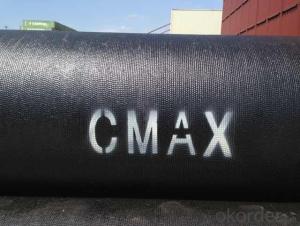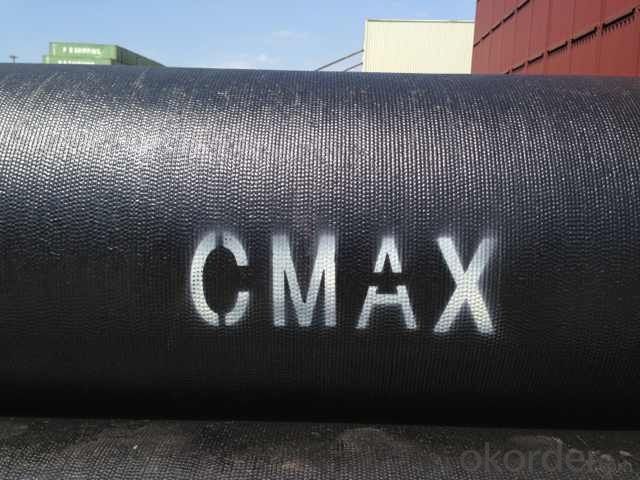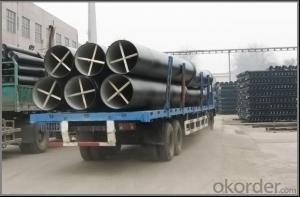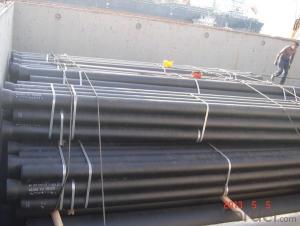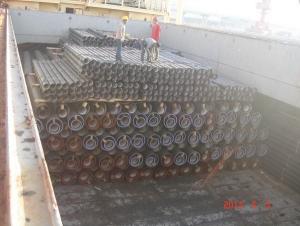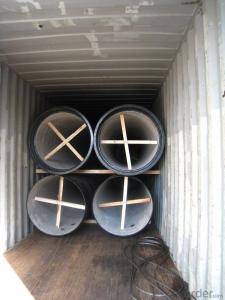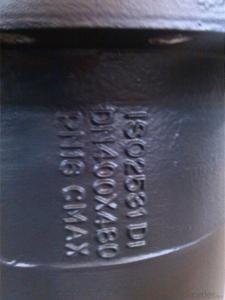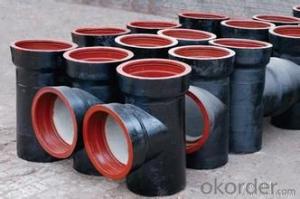DUCTILE IRON PIPE DN250 K7 CLASS
- Loading Port:
- Tianjin
- Payment Terms:
- TT OR LC
- Min Order Qty:
- -
- Supply Capability:
- 30000Tons m/month
OKorder Service Pledge
OKorder Financial Service
You Might Also Like
CNBM ductile iron pipe ranges from DN80-DN1600mm (T-Type, Class K9), effective length 6m, comply with ISO2531 Standard
Company Profile
CNBM International Corporation is the leading production base and renowned supplier of Ductile Iron Water Pipe systems of both potable and waste water in China. We are constantly looking to develop high quality products to ensure the longest service life and wonderful performance.
CNBM Pipelines regard quality as the essential factor leading to successful business. Every pipe is tested in accordance with BS EN545 (water application) or BS EN598 (sewer application). CNBM Pipelines products comply with and are tested according to the relevant European and International Standards. Our pipes are manufactured under the quality management system BS EN ISO 9001. After years of efforts, CNBM Pipelines has built up great reputation in terms of quality and service among customers worldwide
Product Introduction
CNBM ductile iron pipe ranges from DN80-DN1600mm (Tyton, T-Type, Class K7/K8/K9), effective length: 6m, complying with BS EN545/EN598/ISO2531/BS4772.
Specification& Payment terms
Internal lining: Pipes shall have an internal cement mortar lining in acc with ISO4179.
External coating: Pipes shall be externally coated with metallic zinc spray plus a further layer of resin painting to ISO8179.
Gasket: 100% SBR/NBR/EPDM gasket in accordance with ISO4633.
Packing: Pipes from DN100 to DN300 be bundled with steel belts, the others are in bulk.
Payment term: By 30% T/T advance payment + 70% Irrevocable L/C at sight.
Packing: In bulk vessel or in container.
- Q: Ways of connecting ductile iron pipes
- In accordance with the wall thickness or pressure capacity, ductile iron pipe is divided into K8, K9, K10, K11, K12 four class, where the contract does not indicate, according to K9 supply.
- Q: How does ductile iron pipe perform in areas with high soil acidity?
- Due to its innate corrosion resistance, ductile iron pipe is highly effective in areas with high soil acidity. It is specifically engineered to endure harsh environments and incorporates a safeguarding lining that shields against damage caused by acidic soil. This lining functions as a barrier, safeguarding the pipe from corrosion induced by the acid in the soil. Moreover, ductile iron pipe exhibits exceptional resistance to external loads, making it well-suited for regions with unstable soil conditions. In conclusion, ductile iron pipe is a dependable option for areas with high soil acidity, as it can withstand corrosive effects and offer enduring performance.
- Q: Can ductile iron pipe be used for high-pressure gas systems?
- Yes, ductile iron pipe can be used for high-pressure gas systems. Ductile iron pipes have excellent strength and durability, making them suitable for handling high-pressure gas applications. Additionally, their corrosion resistance properties make them an ideal choice for gas transmission systems.
- Q: How does ductile iron pipe perform in areas with high groundwater salinity?
- Due to its inherent resistance to corrosion, ductile iron pipe is highly effective in areas with high groundwater salinity. The presence of elevated levels of salt and minerals in the groundwater can lead to the corrosion and deterioration of certain materials, but ductile iron is highly resilient to this type of corrosion. Its composition and manufacturing process make it less susceptible to damage from corrosive elements found in high salinity water. The primary reason for the corrosion resistance of ductile iron pipe lies in its protective iron oxide coating, which naturally forms on both the interior and exterior surfaces of the pipe. This coating acts as a barrier, preventing direct contact between the pipe and the corrosive elements present in the groundwater. Additionally, ductile iron pipes are often lined with cement mortar or a protective epoxy coating, further enhancing their resistance to corrosion and providing an extra layer of protection. Moreover, ductile iron pipe boasts an extended lifespan, often surpassing 100 years, making it an ideal choice for areas with high groundwater salinity. Its durability and resistance to corrosion ensure that it can withstand the harsh conditions associated with high salinity environments, minimizing the frequency of repairs or replacements. In conclusion, ductile iron pipe is an exceptional option for areas with high groundwater salinity due to its corrosion resistance properties. Its protective iron oxide coating, along with optional linings, offers a dependable and long-lasting solution, guaranteeing the integrity and performance of the pipe system even in demanding environments.
- Q: What is the relationship between the direction of the spigot and the direction of the flow in the ductile iron pipe?
- The utility model is mainly used for conveying water, and is an ideal choice for tap water pipes.
- Q: How are ductile iron pipes protected against root intrusion?
- Ductile iron pipes are protected against root intrusion through the use of protective coatings and barriers. One common method is to apply an external coating, such as a bituminous or epoxy layer, which acts as a deterrent for root penetration. Additionally, root barriers made of high-density polyethylene or other materials can be installed around the pipes to further prevent root intrusion. These measures help to maintain the structural integrity of the pipes and prevent any potential damage caused by root growth.
- Q: Can ductile iron pipes be used for underground mining applications?
- Underground mining applications can indeed utilize ductile iron pipes. Ductile iron, renowned for its robustness, is capable of enduring the demanding conditions and weighty burdens that mining ventures entail. This material exhibits remarkable resistance to corrosion and possesses the capacity to withstand high-pressure and high-temperature settings. Furthermore, ductile iron pipes offer flexibility, facilitating effortless installation and maintenance, rendering them fitting for underground mining applications that prioritize mobility and adaptability. In summary, ductile iron pipes present a dependable and economical option for underground mining operations.
- Q: How does ductile iron pipe handle ground movement and settlement?
- Ductile iron pipe is known for its excellent ability to handle ground movement and settlement. Due to its inherent strength and flexibility, it can withstand significant ground shifts without experiencing major damage or failure. One of the key features of ductile iron pipe is its high tensile strength, which allows it to withstand external forces and pressures. This strength enables the pipe to resist the effects of ground movement, such as soil settlement, subsidence, or shifting due to seismic activity. Moreover, ductile iron pipe has inherent flexibility, which allows it to absorb and distribute stress caused by ground movement. The pipe's flexibility helps to minimize the impact of settlement by allowing it to adjust and adapt to changes in the surrounding soil. This characteristic helps prevent the pipe from cracking, breaking, or leaking when the ground shifts or settles. Additionally, ductile iron pipes are often installed with flexible joints, such as push-on or mechanical joints, which further enhance their ability to accommodate ground movement. These joints provide a degree of flexibility and movement, allowing the pipe to adjust to changes in the soil without experiencing stress concentrations or structural failure. Furthermore, ductile iron pipe is highly resistant to corrosion, which is another important factor in its ability to handle ground movement and settlement. Corrosion can weaken pipes and make them more susceptible to damage during ground shifts. However, the corrosion-resistant properties of ductile iron help maintain the pipe's structural integrity and durability, even in challenging soil conditions. In summary, ductile iron pipe is well-suited to handle ground movement and settlement due to its high tensile strength, flexibility, and corrosion resistance. These properties allow the pipe to withstand external forces and adapt to changes in the surrounding soil, minimizing the risk of damage, leaks, or failure.
- Q: What are the different types of valves available for ductile iron pipe?
- There are several types of valves available for ductile iron pipe, including gate valves, butterfly valves, check valves, ball valves, and globe valves.
- Q: Can ductile iron pipe be used for hydroelectric power generation?
- Yes, ductile iron pipe can be used for hydroelectric power generation. Ductile iron pipes are known for their strength, durability, and resistance to corrosion, making them suitable for various applications including the transportation of water in hydroelectric power plants.
Send your message to us
DUCTILE IRON PIPE DN250 K7 CLASS
- Loading Port:
- Tianjin
- Payment Terms:
- TT OR LC
- Min Order Qty:
- -
- Supply Capability:
- 30000Tons m/month
OKorder Service Pledge
OKorder Financial Service
Similar products
Hot products
Hot Searches
Related keywords
